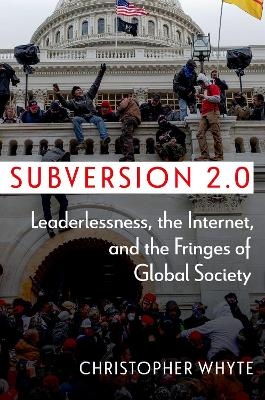
Subversion 2.0
Leaderlessness, the Internet, and the Fringes of Global Society
Seiten
2024
Oxford University Press Inc (Verlag)
978-0-19-777335-2 (ISBN)
Oxford University Press Inc (Verlag)
978-0-19-777335-2 (ISBN)
- Lieferbar
- Versandkostenfrei
- Auch auf Rechnung
- Artikel merken
Why are conspiracy theories, extremist rhetoric, and acts of antagonism by fringe elements of society so much more visible today than in years past? The Capitol Insurrection of January 6, 2021, and the surge of medical skepticism during the global COVID-19 pandemic have highlighted the challenge of extreme rhetoric in global society, with increasing attention paid to the enabling role of the Internet. But beyond the ways in which the Internet allows for connection, how do fringe ideas travel into the mainstream to become more significant movements?
In Subversion 2.0, Christopher Whyte describes the transformation of societal subversion in the digital age. Whyte makes the case that "leaderlessness"--characterized by an evolving and uneven feedback loop linking fringe spaces to mainstream elite rhetoric and popular discourse--has emerged in recent years as the default format of subversive activity. Through case explorations and novel data, Whyte shows how extreme narratives that originate in conspiratorial, restrictive virtual spaces are rapidly filtered into mainstream settings due to a series of socio-technological conditions present in the Web 2.0 era. As a result, fringe narratives and symbols often become the lens through which social and political elites interpret information that they then spread through public speech, which is projected back to subversive spaces and used to perpetuate fringe narratives.
By examining the uneven feedback loop of leaderlessness, Whyte argues that social Internet platforms act as a vehicle for transmitting and amplifying extreme rhetoric but often fail to moderate extremism in turn. He ultimately shows how societal subversion, an activity that is about degrading existing power structures without directly attacking them, has taken on a new, dynamic form in the digital age.
In Subversion 2.0, Christopher Whyte describes the transformation of societal subversion in the digital age. Whyte makes the case that "leaderlessness"--characterized by an evolving and uneven feedback loop linking fringe spaces to mainstream elite rhetoric and popular discourse--has emerged in recent years as the default format of subversive activity. Through case explorations and novel data, Whyte shows how extreme narratives that originate in conspiratorial, restrictive virtual spaces are rapidly filtered into mainstream settings due to a series of socio-technological conditions present in the Web 2.0 era. As a result, fringe narratives and symbols often become the lens through which social and political elites interpret information that they then spread through public speech, which is projected back to subversive spaces and used to perpetuate fringe narratives.
By examining the uneven feedback loop of leaderlessness, Whyte argues that social Internet platforms act as a vehicle for transmitting and amplifying extreme rhetoric but often fail to moderate extremism in turn. He ultimately shows how societal subversion, an activity that is about degrading existing power structures without directly attacking them, has taken on a new, dynamic form in the digital age.
Christopher Whyte is Associate Professor of Homeland Security and Emergency Preparedness at the L. Douglas Wilder School of Government and Public Affairs at Virginia Commonwealth University. His research focuses on the intersection of information technologies and international security. Specifically, his work examines the decision-making dynamics of cyber operations, the role of fringe virtual spaces in supporting influence campaigns, and the impact of artificial intelligence on cyber conflict. Whyte is an author or co-author of more than three dozen peer-reviewed articles on these subjects as well as three books on cyber conflict, information warfare, and military innovation.
| Erscheinungsdatum | 17.08.2024 |
|---|---|
| Reihe/Serie | Disruptive Technology and International Security |
| Verlagsort | New York |
| Sprache | englisch |
| Maße | 156 x 234 mm |
| Gewicht | 621 g |
| Themenwelt | Sozialwissenschaften ► Kommunikation / Medien ► Medienwissenschaft |
| Sozialwissenschaften ► Politik / Verwaltung ► Politische Systeme | |
| Sozialwissenschaften ► Politik / Verwaltung ► Staat / Verwaltung | |
| Sozialwissenschaften ► Soziologie | |
| ISBN-10 | 0-19-777335-4 / 0197773354 |
| ISBN-13 | 978-0-19-777335-2 / 9780197773352 |
| Zustand | Neuware |
| Informationen gemäß Produktsicherheitsverordnung (GPSR) | |
| Haben Sie eine Frage zum Produkt? |
Mehr entdecken
aus dem Bereich
aus dem Bereich
Eine Einführung
Buch | Softcover (2022)
Springer VS (Verlag)
CHF 46,15
wie KI und virtuelle Welten von uns Besitz ergreifen – und die …
Buch | Hardcover (2023)
Heyne (Verlag)
CHF 29,90


